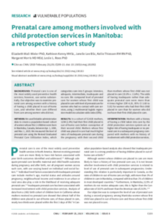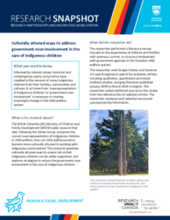Displaying 181 - 190 of 341
The objective of this study was to examine prenatal care among women with a history of having a child placed in out-of-home care, and whether their care differed from care among women who did not.
The goals of this study were twofold: (1) to compare the pragmatic language skills (i.e., social communication skills) of 42-month-old neglected children with those of same-aged non-neglected children and (2) to measure the prevalence of pragmatic difficulties among the neglected children.
The objectives of this article are to: 1) estimate the rate of overrepresentation of First Nations children and youth involved in child welfare investigations in the Ontario child welfare system and, 2) determine which factors drive the overrepresentation of First Nations children in child welfare at the investigation stage compared to White children.
Despite limited research on the effectiveness of mind-body interventions with children and adolescents in out-of-home care in Canada, a review of available literature on mindfulness, arts-based methods, and yoga suggests these therapeutic interventions promote resilience and positive development.
"In the Cowichan Valley, a growing network of mothers, advocates, midwives, doctors and elected officials is trying to take a different approach to address the ‘humanitarian crisis’ of Indigenous kids in care" in British Columbia, Canada, says this article from the Globe and Mail.
The present study describes a community implementation of treatment foster care (TFC) for children and youth involved with child welfare in Ontario, Canada.
The Premier of the Canadian province of Saskatchewan, Scott Moe, has issued an apology to the indigenous communities of the province for "the pain and the sadness" experienced during what is known as the "Sixties Scoop, when "about 20,000 Indigenous children were seized from their birth families and relocated to non-Indigenous homes starting in the 1950s until the late 1980s."
This snapshot provides a brief overview of research examining culturally attuned ways to assess risk so that Indigenous children in Australia can be safely supported.
Adolescents who are involved with child welfare systems, either in foster care or under child welfare supervision, across Canada, disproportionately “cross-over” to youth criminal justice proceedings. This article critically considers disadvantages “cross-over” youths face under the Youth Criminal Justice Act (YCJA).
The aim of this meta-analysis is to identify the most effective interventions to promote parental engagement and family reunification in high-income countries.



